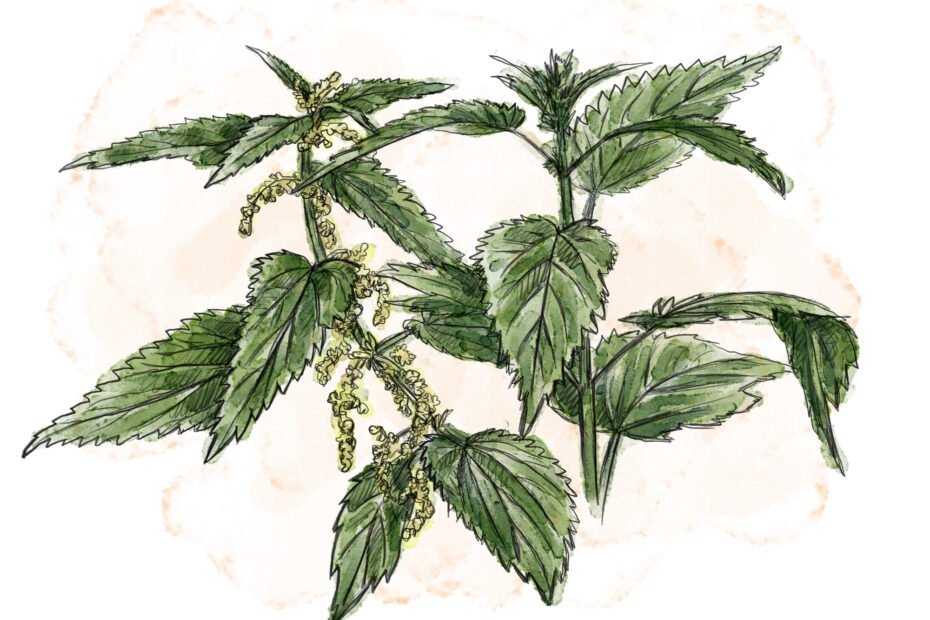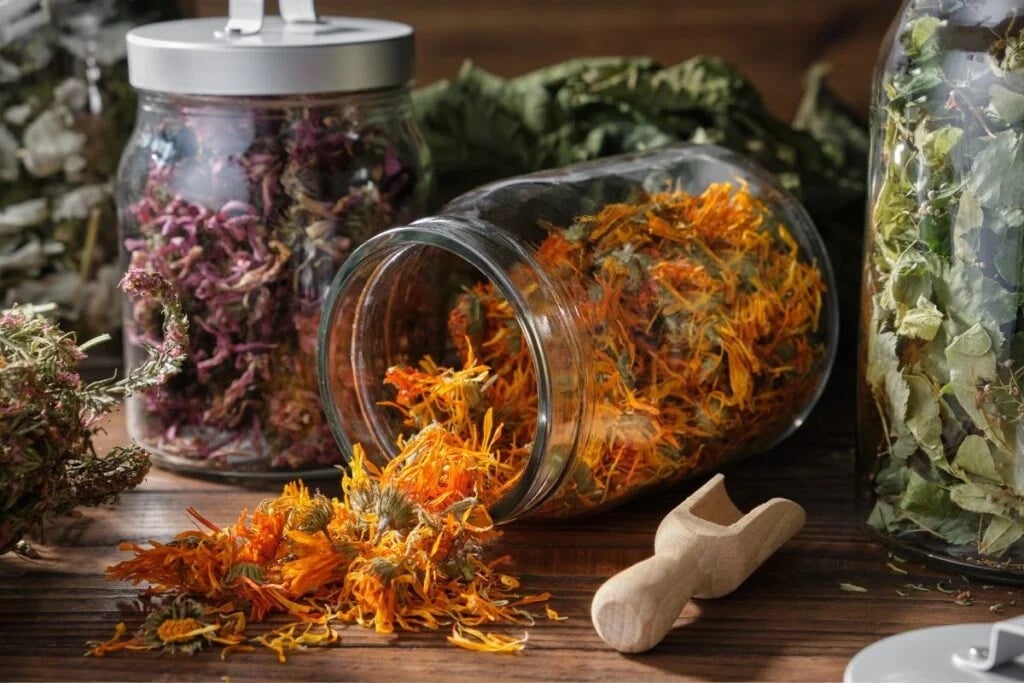Nettle tea is made from an “evil” one with stinging bristles. You need to wear gloves to protect your hands while gathering the raw material of the weed. The nettle tea benefits are worth the effort!
There are 45 species in its genus, and the best-known and most valuable is the common nettle (Urtica dioica). It is a perennial herbaceous plant, about 60–150 cm tall, with stinging hairs. The stem is four-trunked and erect, and the leaves are heart-shaped and oblong. The flowers are green, inconspicuous, and clustered in panicles, and the fruit is egg-shaped, about 1,2–1,5 mm long. Common nettle reproduces through rhizomes and seeds.
What is The Nettle?
Nettles grow naturally in rotting and nitrogen-rich soils in yards, bushes, wet woods, and riversides, as well as in farmhouses and kitchen gardens. They are often considered as weeds for this reason. However, people use them as medicines, food, vitamins, cosmetics, dyes, and fertilizers.
- Rural people add nettles to their feed as natural vitamins.
- The long, thin, silk-like fibers of the nettle’s stem are suitable for making cloth, twine, and rope.
- Pharmaceuticals, confectionery, and perfumery make green dyes from nettle leaves and yellow dyes from the roots.
- The first nettle shoots that grow in spring are the richest in vitamins and are suitable for food use. For example, as a main ingredient in salads and even in soups. The nutritional quality of young nettle leaves is comparable to that of legumes. The leaves contain fat, protein, cellulose, formic vinegar, butyric acids, tannin, pesticides, glycosides, minerals (iron, sodium, potassium, silicon, sulfur, chlorine, etc.), ascorbic acid, vitamins K, B, and carotene, and chlorophyll. Before using nettles for food, blanch them to prevent stinging.
There are more beneficial weeds that are not worth throwing away in the compost.
Collection of Nettle Raw Material
Nettle (a whole plant) for medicinal raw material is best harvested for the first time in mid-June. The plants are still in flower at this time. The herb grows back a second and third time, keep cutting it till the first frost. The over-flowered nettles are no longer suitable for herbage due to their decreased medicinal properties. It is advisable to dry nettles in well-ventilated rooms, in shelters out of direct sunlight, by spreading the herbs in a thin layer, or by keeping the temperature in the drying room between 45 and 50 degrees Celsius.
Dig the nettle roots in late autumn or early spring for medicinal purposes. Wash thoroughly and dry in an oven at temperatures up to 60 degrees Celsius.
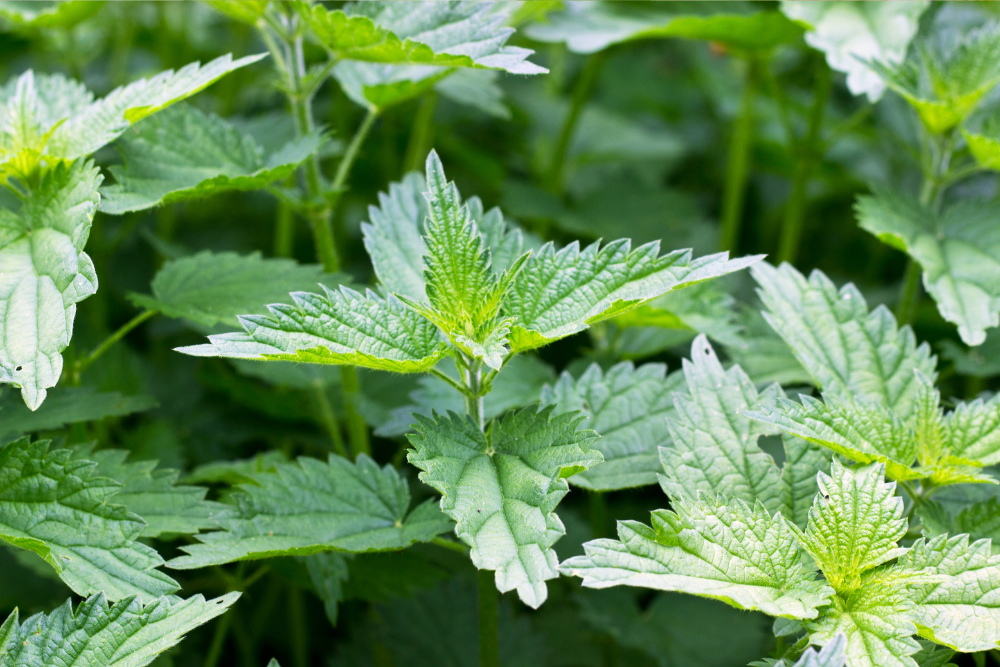
What is Nettle Rich in?
Nettle is well known for its healing properties and consumption as a tea. Nettle has antibacterial, antifungal, astringent, and anti-inflammatory properties. It is rich in vitamins A, B, C, and K, carotene and iron.
You can use the whole nettle plant: leaves, stems, and roots can be crushed and made into powders, tinctures, creams, teas, etc. Although people have been using nettles as a medicinal herb for centuries. Modern research also confirms the health benefits of nettle tea.
Benefits of Nettle Tea: Urinary Tract and Kidneys
Nettles help flush out harmful bacteria from the urinary tract in various urinary tract diseases, such as benign prostatic hyperplasia, which causes an enlarged prostate, pain, and other urinary problems in men. This herb can complement any medication used for urinary tract infections; however, consult your doctor about herb-drug interactions.
Nettle promotes healthy urination and inhibits the growth of pathogens that cause kidney stones. A study published in the journal Molecular Medicine Reports (2014) shows that nettle tea reduces the accumulation of calcium oxalate crystals, a major cause of kidney stones.
Nettle Tea Benefits: Pain Relief
Nettles relieve a wide range of aches and pains of the muscles, particularly those associated with arthritis (osteoarthritis). The tea of the nettle can reduce inflammation and pain symptoms due to its anti-inflammatory properties.
Allergies and skin irritations. Although nettle leaves irritate the skin, nettle tea relieves the symptoms of irritated or allergic skin. The antihistamine, anti-inflammatory, and antimicrobial properties of nettles help treat eczema and acne. A 2017 study published in the Iranian Journal of Pharmaceutical Research suggests that hay fever, a type of allergy, can be treated with nettle tea.
The drink helps with irritations of the ears, nose, and throat.
Nettle Tea Helps for Cardiovascular System
- Regulates blood sugar and blood pressure. Nettle tea affects blood glucose levels. It helps the pancreas produce and secrete more insulin, a hormone that lowers blood sugar levels.
- Nettle tea can reduce the risk of cardiovascular diseases such as stroke or heart attack.
- Improves blood: increases hemoglobin, purifies the blood, and removes toxins from the body.
- To activate blood circulation. Wrap yourself in nettle wicks in the sauna; the burning treatment lasts a few minutes, following a well-being feel.
Other Nettle Tea Health Promoting “Skills”
- The polyphenols found in nettle tea are particularly useful in preventing chronic inflammation-related diseases, such as diabetes, obesity, cancer, and heart disease. Nettle extract treats breast or prostate cancer.
- The powerful antioxidants in nettle tea protect against aging and cell damage.
- Nettle tea helps to regulate digestion and reduce constipation and diarrhea.
- To strengthen bones. Nettles contain a variety of amino acids, proteins, flavonoids, and bone-strengthening minerals: iron, calcium, magnesium, silicon, potassium, and zinc. Nettle tea is considered to be a bone-strengthening aid.
- For strengthening hair and dandruff control.
- Vitamins A and C and antioxidants in nettle tea help boost immunity. Nettle tea stimulates T cells, which help the body fight various infections and other diseases that weaken the immune system.
- For weight loss. Nettles are highly nutritious. They help you lose weight without feeling hungry, without extra calories, and boost your metabolism.
- For wound care or washing. Nettles contain formic acid, which is the reason for stinging. They have antiseptic and cleansing properties at the same time. You can apply and wash wounds with nettle ointment.
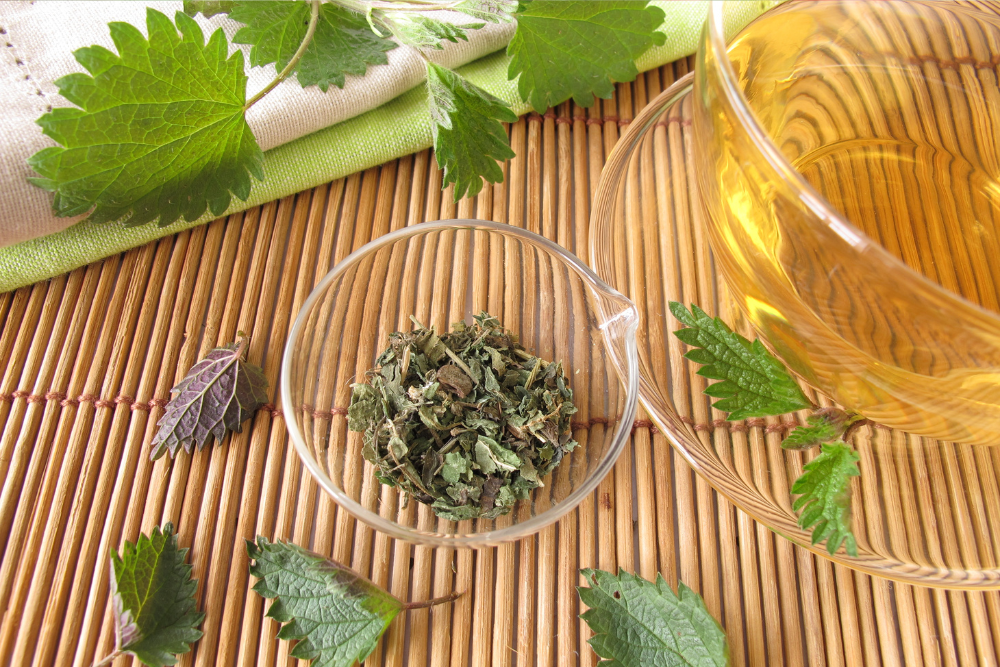
How to Make Nettle Tea
You can improve your health by drinking one cup of nettle tea daily.
You can buy nettle leaf tea pre-packaged or in tea bags. Collect, and dry nettles yourself or make tea from the green leaves as well.
Experiment with fresh or dried leaves and your favorite ratio of leaves to water. The larger the leaves or the more leaves you add, the more intense the flavor and aroma of the tea you get.
- Cover the nettle leaves in a cup with boiling water (100 degrees Celsius). Let them steep for at least 5–10 minutes.
- For larger quantities in a teapot, you can bring it to a boil and leave it on the hot stove for 5 minutes.
- Strain the tea using a sieve when pouring it into cups.
- You can flavor the tea with honey, cinnamon, or stevia.
Nettle Tea for Women
The tea of nettle reduces heavy bleeding during menstruation and normalizes the entire menstrual cycle.
Nettle drink is not recommended for pregnant women as it can cause uterine contractions and premature birth. But you can drink a little and weaker nettle tea if needed. Women can drink strong nettle tea to encourage labor to start when they reach the due date.
Nettle tea stimulates milk production and increases the amount of milk for breastfeeding mothers. Drink the beverage immediately after giving birth. The vitamins and trace elements in nettles, especially iron, will help the body recover. However, keep in mind that taking nettle tea can lead to a risk of overproduction of milk and mastitis.
Interactions with nettle tea may cause unexpected side effects with medications you take. If you want to drink nettle tea to increase the amount of breast milk, you should consult your doctor or a lactation consultant.
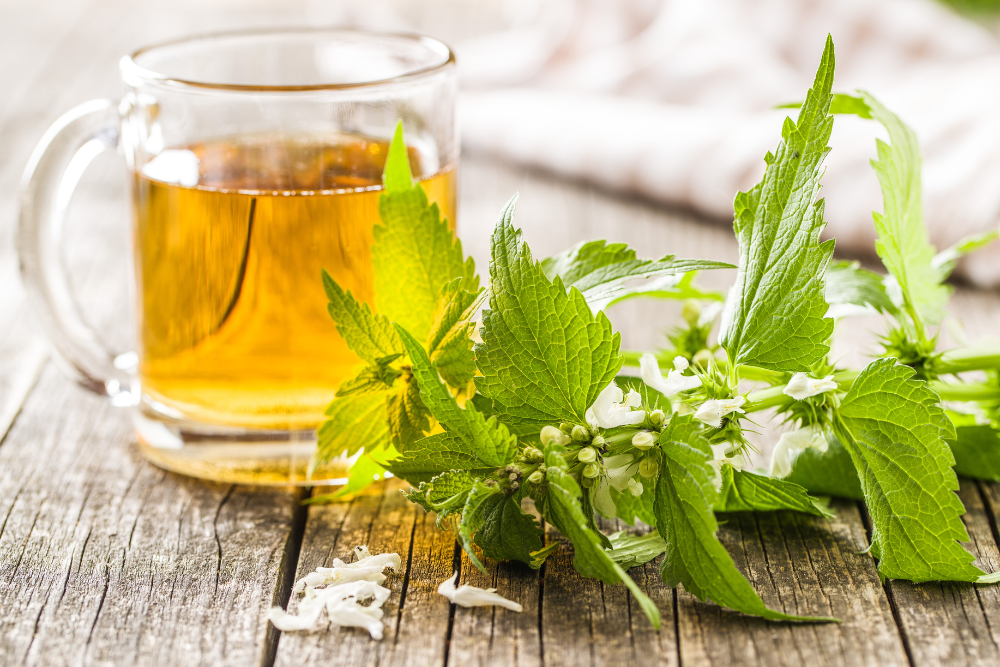
How to Consume Nettle Tea
Use both nettle leaf and root teas for liver pain, reduced blood clotting, rheumatism, anemia, diabetes mellitus, enterocolitis, acute gastritis, internal bleeding, kidney stones, and some urinary tract disorders.
Treat abscesses and pimples with a mixture of nettle leaves, vinegar, and water in equal parts. This mixture will help the pus ‘rise’ to the surface.
Boil five tablespoons of nettles in 500 ml of water over low heat. Sweeten if needed, and drink a glass four times a day. Use this beverage to strengthen the heart.
Nettle Tea for Men
Try nettle leaf and root tea to treat I- or II-stage prostate adenomas. Take two heaped teaspoons of chopped nettle roots and leaves, cover with a cup of boiling water, and continue for about 5 minutes. Strain before use. Drink 1 cup each morning and evening for 4-6 weeks.
Drinking nettle seed tea 30 minutes before or 1 hour after a meal increases your male strength.
Nettles are good for your health and beauty. You can easily make products with nettles to enhance your beauty at home.
Once you have made a nettle infusion, you can wet cotton wool discs. Apply these compresses to your eyes as a clump to help remove dark circles from your eyes. You can also apply the nettle decoction to your face. Use it as a toner before applying a cream as well.
Make a nettle infusion that will leave your hair feeling nourished, healthier, and firmer. Add three tablespoons of fresh or dried nettle leaves and stems to a pot or bowl and cover with 500 ml of boiling water. Leave to stand for 1 hour to soak well and strain before use. Rinse clean, shampooed hair with this nettle infusion, massaging it into the roots of the hair to activate the blood circulation to the scalp. Blow-dry your hair; no rinsing is required.
Nettle Tea Side Effects
Many people enjoy tea rituals. A cup of nettle tea would be the right choice for your daily routine because of its health benefits. Although nettle tea has many health-giving properties, it may not be appropriate for everyone.
- It is advisable to take nettle tea in small doses if you have high blood pressure. One tablespoon of dried nettle leaves in 250 ml of boiling water and let it steep for at least 10 minutes. Drink 10 mL three times a day.
- For pregnant women, nettle tea can cause premature birth.
- People with thrombophlebitis and varicose veins should also avoid nettle tea.
However, if you have a chronic illness, consult your doctor before trying any new herbal tea. Even all-natural foods and drinks, like tea, can cause allergic reactions or interact with certain medications you are taking. Some herbs can be harmful to people with certain medical conditions.
Sources:
https://www.healthline.com/health/food-nutrition/nettle-tea#what-is-nettle
https://www.webmd.com/diet/health-benefits-nettle-leaf
https://www.medicalnewstoday.com/articles/nettle-tea-benefits#properties
Research:
https://pubmed.ncbi.nlm.nih.gov/37375728/
https://www.ncbi.nlm.nih.gov/pmc/articles/PMC9253158/
Associative photos from © Canva.
